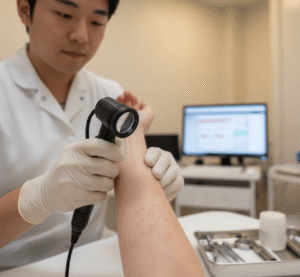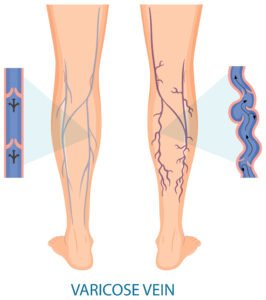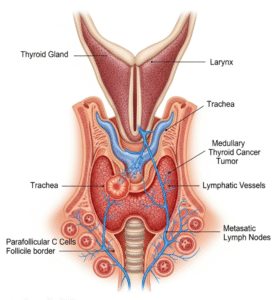Overview
Loss of appetite, also known as anorexia (not to be confused with anorexia nervosa), is a reduced desire to eat or lack of interest in food. It can be temporary or chronic and may affect nutrition, energy levels, and overall health.
In Korea, hospitals and clinics provide comprehensive evaluation and treatment for loss of appetite, using laboratory tests, imaging, and specialist consultations to identify the underlying cause. Early recognition ensures proper management, improved nutrition, and prevention of complications.
Key Facts
- ➔ Loss of appetite can be mild, moderate, or severe, impacting daily calorie intake.
- ➔ It may result from physical, psychological, or medication-related causes.
- ➔ Chronic loss of appetite can lead to weight loss, malnutrition, and weakened immunity.
- ➔ It is often associated with other symptoms such as fatigue, nausea, or digestive discomfort.
- ➔ Proper diagnosis is essential to address the underlying condition and restore healthy eating habits.
What is Loss of Appetite?
Loss of appetite refers to a decreased desire to eat, which can be temporary, recurrent, or persistent.
- ➔ Temporary loss: Often caused by minor illnesses, stress, or medications.
- ➔ Persistent loss: May indicate chronic medical conditions such as liver disease, kidney disease, infections, or cancer.
- ➔ Clinical importance: Loss of appetite can be a significant warning symptom, especially when accompanied by weight loss or other systemic symptoms.
- ➔ Impact on health: Reduced food intake can lead to nutrient deficiencies, fatigue, and increased susceptibility to infections.
What Symptoms Are Related To
Loss of appetite may be accompanied by other symptoms depending on its cause:
- ➔ Nausea or vomiting
- ➔ Weight loss or unintended weight changes
- ➔ Fatigue or weakness
- ➔ Abdominal pain or discomfort
- ➔ Fever or night sweats in infections or systemic illnesses
- ➔ Mood changes such as depression or anxiety
- ➔ Altered taste or smell perception
Identifying these associated symptoms helps healthcare providers determine the underlying cause and plan appropriate treatment.
What Causes / Possible Causes
Loss of appetite can result from a variety of conditions:
- ➔ Infections: Viral or bacterial infections can temporarily suppress appetite.
- ➔ Digestive disorders: Conditions like gastritis, liver disease, or pancreatitis.
- ➔ Metabolic disorders: Diabetes, thyroid disorders, or electrolyte imbalances.
- ➔ Chronic diseases: Cancer, kidney disease, or heart failure.
- ➔ Neurological conditions: Stroke, dementia, or depression affecting appetite regulation.
- ➔ Medications or treatments: Chemotherapy, antibiotics, or certain pain medications.
- ➔ Psychological causes: Stress, anxiety, or eating disorders affecting food intake.
Correct identification of the cause is essential to prevent malnutrition and related health complications.
When Should I See My Doctor
Seek medical attention if loss of appetite is:
- ➔ Persistent for more than 2-3 weeks without obvious reason
- ➔ Accompanied by unintended weight loss
- ➔ Associated with persistent nausea, vomiting, or abdominal pain
- ➔ Occurring with fever, night sweats, or fatigue
- ➔ Affecting daily activities or leading to malnutrition
- ➔ Seen in individuals with chronic diseases or advanced age
Early evaluation helps diagnose underlying conditions and prevent nutritional deficiencies.
Care and Treatment
Treatment for loss of appetite depends on the underlying cause:
- ➔ Infections or acute illness: Treating the infection often restores appetite.
- ➔ Digestive disorders: Medications for gastritis, acid reflux, or liver conditions can improve appetite.
- ➔ Chronic diseases: Addressing heart failure, kidney disease, or cancer-related symptoms.
- ➔ Psychological causes: Counseling, therapy, or medications for depression, anxiety, or stress.
- ➔ Medication-induced appetite loss: Adjusting doses or switching medications under medical supervision.
- ➔ Nutritional support: Small, frequent meals, nutrient-dense foods, and supplements to maintain energy and nutrient intake.
Lifestyle measures, such as hydration, moderate exercise, and pleasant meal environments, can also help stimulate appetite.
Treatment Options in Korea
Korean hospitals provide comprehensive care for loss of appetite:
- ➔ Laboratory tests: Blood work to identify infections, metabolic imbalances, or deficiencies.
- ➔ Imaging studies: Ultrasound, CT scans, or endoscopy to detect digestive or systemic issues.
- ➔ Specialist consultations: Gastroenterologists, endocrinologists, oncologists, or mental health professionals.
- ➔ Nutritional therapy: Dietitian-guided meal planning, supplements, and enteral nutrition if necessary.
- ➔ Multidisciplinary approach: Collaboration between physicians, dietitians, and psychologists for personalized management.
Leading hospitals such as Seoul National University Hospital, Asan Medical Center, and Samsung Medical Center provide state-of-the-art diagnostics and treatment plans to restore appetite and address underlying conditions effectively.
In Summary: Loss of appetite is a common symptom with many possible physical, neurological, or psychological causes. Timely evaluation and treatment in Korea can prevent malnutrition, improve energy levels, and treat underlying conditions effectively.
- ➔ Key Takeaway: Persistent loss of appetite should not be ignored, particularly if associated with weight loss or other systemic symptoms.
- ➔ Action Point: Seek medical evaluation for proper diagnosis, individualized care, and nutritional support.













